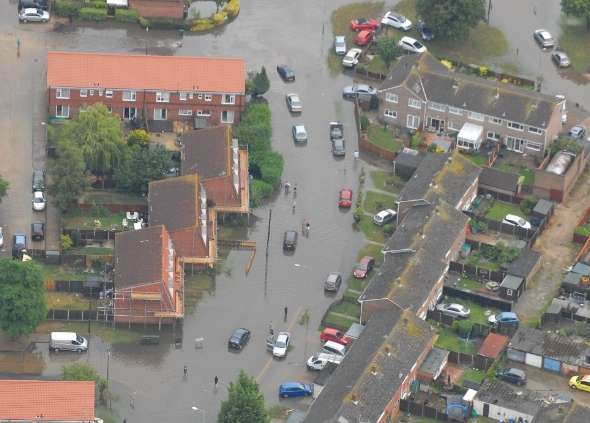BRIC Seminar/Workshop 24th Nov 2022
Cross Channel Collaboration to Reduce Flood Impact online event
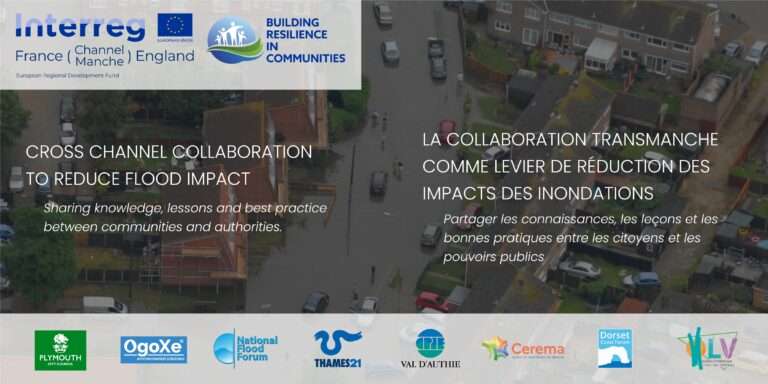
Welcome to part 3/4 of this blog series, below we continue on from the end of part 2/4
At the end of blog 2 we finished on the key outcomes from question one’s Jamboard. We pick up from there after the group had a 35 minute open discussion on Jamboard one’s topic to discuss all the comments, it was clear to attendees, that there were some common patterns emerging.
We then asked attendees to join us via link, to either French or English language Jamboards, and Question’s 2 & 3 were asked consecutively in the same session. With guests asked to return to seminar after 20 minutes for a 35 minute discussion once again.
Q2: What gaps and challenges are communities identifying in terms of flood risk management service delivery?
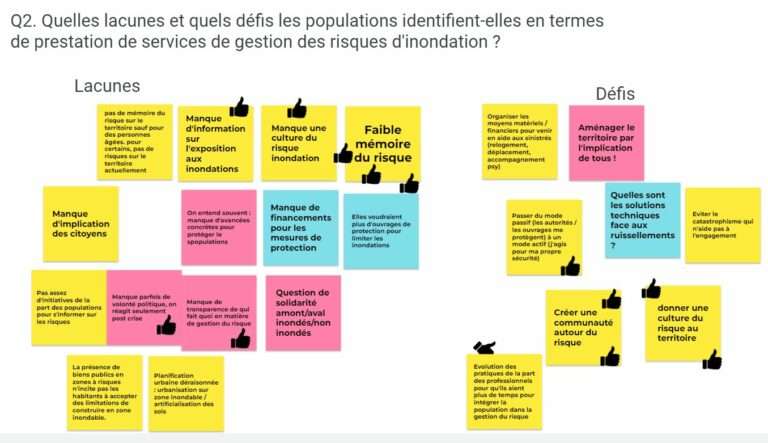
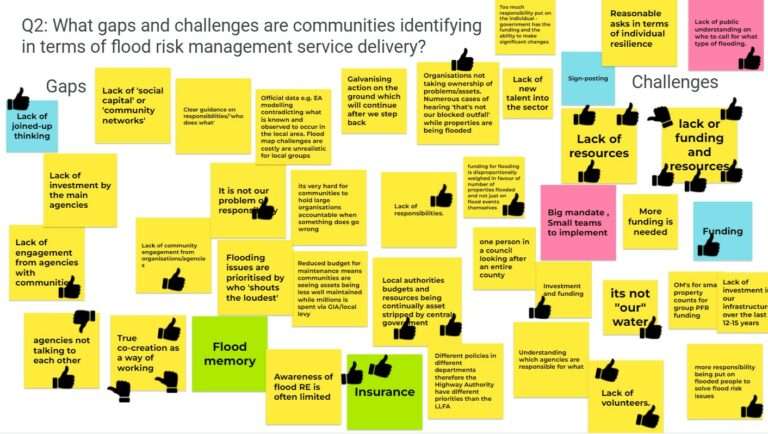
Below is a organised summery of all the points from Jamboard 2.
Funding and resources
- Investment and funding
- More funding is needed
- Lack of resources
- Local Authority budgets and resources being continually asset stripped by central government
- Reduced budget for maintenance means communities are seeing assets being less well maintained while millions is spent via GIA/local levy
- OM’s for small property counts for group PFR funding
- funding for flooding is disproportionally weighed in favour of number of properties flooded and not just on flood events themselves
- Lack of investment by the main agencies
- Lack of investment in our infrastructure over the last 12-15 years
Volunteers and staff
- Lack of volunteers
- Lack of new talent into the sector
- Big mandate, small teams to implement
- One person in a council looking after an entire county
Public knowledge
- Lack of public understanding on who to call for what type of flooding.
- Awareness of flood RE is often limited
- Flood memory
- Sign-posting
- Insurance
Different agencies have different responsibilities/priorities
- Organisations not taking ownership of problems/assets. Numerous cases of hearing ‘that’s not our blocked outfall’ while properties are being flooded
- It’s not “our” water
- Understanding which agencies are responsible for what
- Different policies in different departments therefore the Highway Authority have different priorities than the LLFA
- It is not our problem or responsibility
- Clear guidance on responsibilities/’who does what’
Agencies not engaging with the community or each other
- Lack of engagement from organisations/agencies with communities
- Agencies not talking to each other
- True co-creation as a way of working
- Lack of joined-up thinking
- Flooding issues are prioritised by who ‘shouts the loudest’
- Official data e.g. EA modelling contradicting what is known and observed to occur in the local area. Flood map challenges are costly are unrealistic for local groups
Community networks
- Lack of ‘social capital’ or ‘community networks’
- Galvanising action on the ground which will continue after we step back
Responsibilities of the individual
- More responsibility being put on flooded people to solve flood risk issues
- Too much responsibility put on the individual – government has the funding and the ability to make significant changes
- Reasonable asks in terms of individual resilience
- Its very hard for communities to hold large organisations accountable when something does go wrong.
Key gaps
- Lack of joined up thinking
- Lack of communication between agencies
- True cocreation as a way of working
- Investment/funding
- Flood memory
Key challenges
- Lack of resources
- Lack of funding
- Reasonable asks in term of personal resilience
- Different policies in different departments
- Politically, we approach flooding after the event. Need to be more proactive!
Key outcomes
- Lack of communication and community engagement often stems from a lack of resources/funding.
Attendees were prompted to switch over to Jamboard 3 half way through the time allotted.
Q3: What gaps and challenges are local agencies identifying in terms of flood risk management service delivery?
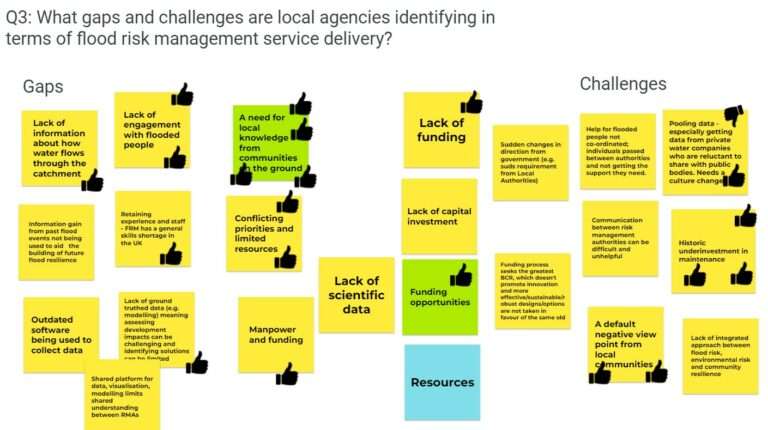
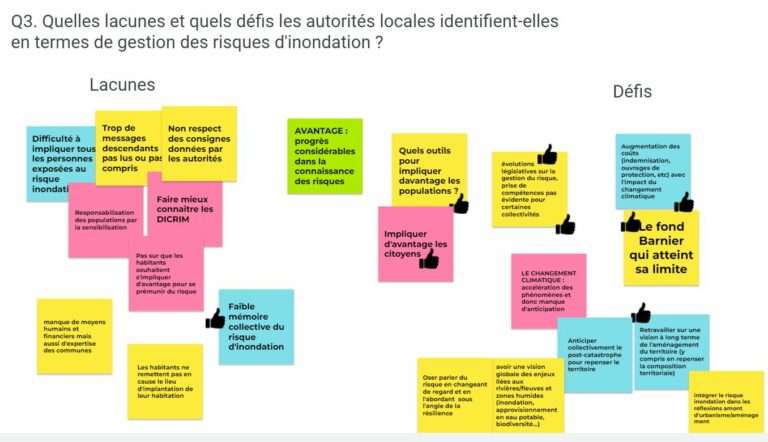
Below is a organised summery of all the points from Jamboard 3.
Funding and resources
- Lack of funding
- Lack of capital investment
- Funding opportunities
- Resources
- Historic underinvestment in maintenance
- Funding process seeks the greatest benefit-cost ratio (BCR), which doesn’t promote innovation and more effective/sustainable/robust designs/options are not taken in favour of the same old
Data
- Lack of information about how water flows through the catchment
- Lack of scientific data
- Lack of ground truthed data (e.g. modelling) meaning assessing development impacts can be challenging and identifying solutions can be limited
- Pooling data – especially getting data from private water companies who are reluctant to share with public bodies. Needs a culture change.
- Shared platform for data, visualisation, modelling limits shared understanding between RMAs
- Outdated software being used to collect data
- Information gain from past flood events not being used to aid the building of future flood resilience
Volunteers and staff
- Manpower and funding
- Retaining experience and staff – FRM has a general skills shortage in the UK
Coordination
- Conflicting priorities and limited resources
- Help for flooded people not coordinated; individuals passed between authorities and not getting the support they need.
- Lack of integrated approach between flood risk, environmental risk, and community resilience
Communication from agencies and communities
- Lack of engagement with flooded people
- A need for local knowledge from communities on the ground
- Communication between risk management authorities can be difficult and unhelpful
- A default negative viewpoint from local communities
Changes in government
- Sudden changes in direction from government (e.g. SuDS requirement from Local Authorities)
Gaps
- A need for local knowledge from communities on the ground
- Lack of engagement with flooded people
- Conflicting priorities and limited resources
- Lack of common flood memory
Challenges
- How do we engage communities more?
- Historic underinvestment in maintenance
- Pooling data to share
- A default negative viewpoint from local communities
- Development in flood zones
- We need to talk more openly about climate change
Key differences between England and France:
France – lack of responsibility of residents and citizens, need for more engagement with communities.
England – lack of resources and funding leads to a lack of engagement and capacity for partnership working.
This blog series will return with part 4/4 on the 19th January 2023
